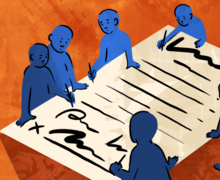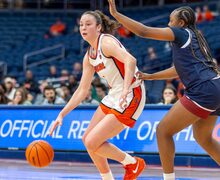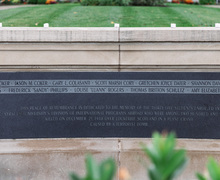Interfaith America founder Eboo Patel discusses religious diversity, democracy
Charlie Hynes | Staff Photographer / The Daily Orange
Dr. Eboo Patel spoke at SU on Tuesday about the importance of religious diversity in democratic principles. He emphasized understanding different identities and building connections to drive meaningful change.
Get the latest Syracuse news delivered right to your inbox.
Subscribe to our newsletter here.
Dr. Eboo Patel, founder and president of Interfaith America, spoke at Syracuse University’s Hendricks Chapel Tuesday evening, advocating for religious diversity and interfaith connection as tools for strengthening democracy.
Throughout his remarks, Patel outlined his views on the key principles of an inclusive community, including the need for cooperation amid division and the values of understanding differing cultural identities. Patel also discussed the importance of fostering inclusive communities to open dialogue on difficult subjects.
“We should not let the challenges of our time overshadow the values that have held us together,” Patel said. “There is strength in our differences, and that strength is something we need to protect and nurture moving forward. Diversity is not just the differences that you like. It’s how you navigate facilitating these challenging conversations.”
To begin, Patel highlighted the importance of recognizing personal identity, noting that it shapes how people connect with others’ familiar traits and allowing empathy to grow. He said people should view their identities with pride, describing examples of identity as the language of a person’s grandparents, the food of their family and their own faith.
Along with individual identity, a person must also work to seek common ground with others, regardless of social and political differences, Patel said. He encouraged the audience to look for traits in others that are important parts of their own identities instead of focusing on issues that divide them.
Instead of seeing difference as a divider, Patel encouraged people to embrace their distinct traits.
Margaret Susan Thompson, an associate professor of political science and history at SU, said she appreciated Patel’s digestible language and clear descriptions of his thoughts.
“He presented potentially very complex ideas in a way that isn’t simplistic, but he makes them accessible to people and he provides solutions. He doesn’t just throw out a bunch of rhetoric, but he provides examples of what people can do,” Thompson said.
Throughout his speech, Patel used metaphors of simple interactions to describe the bonds different communities can create with each other. He likened a potluck dinner with friends to the diversity that exists in America, saying that a community thrives when people bring their rich history and perspectives with them to the table.
“What makes a potluck special is when people connect their identity to their dish. A diverse community will bring diverse dishes, each infused with the cultural identity of the person who prepared it.” Patel said.
He connected this lesson to the bravery of the firefighters in Los Angeles, saying firefighters across the area risked their lives for others, without stopping to consider the identities of those they were saving.
“There are not that many stories of firefighters saying, ‘I want to fight fires of people who don’t have my skin color, who come from a conflicting tribe, who don’t speak my ancestral language, or whose views I don’t like,’” Patel said.
Michael Whitenton, director of academic initiatives at Interfaith America, emphasized the importance of curiosity and a willingness to learn from differences, saying that judgments and predeterminations can make being curious about others challenging.
“It’s really easy to get sucked into narratives of extremism, because we so rarely actually talk to people that believe differently…We learn about it from social media or from the news, and what trends on social media and in the news is usually not representative,” Whitendon said.
Jorge Andre Morales, a SU junior studying history and anthropology, said even with many other commitments on Tuesday night, he set time aside to attend the discussion because it was an unusual opportunity to learn about cooperation in a tense time for many Americans.
“It’s been a long few weeks with the current political situation, but it reminds you that there are things that you can do,” Morales said. “It’s not just a situation. You don’t need to sit tight and wait, you can still go and work to make the community better.”
Adam Baltaxe, an international relations and Spanish major, said his time working with the Student Assembly for Interfaith Leaders made Patel’s sentiments resonate even more for him. He reflected on how students often make generalizations about each other, rather than embracing open-mindedness and facilitating discussions that could contribute to a healthier campus community.
Baltaxe and Morales also stressed the importance of keeping institutions like Hendricks Chapel open for these conversations. Brian Konkol, the vice president and dean of Hendricks Chapel, helped lead Tuesday’s discussion.
“Without a place like this where we can come to talk about these things, how are we supposed to engage in these ideas? It becomes closed off. There’s a lack of communication. That’s when ideas die,” Morales said.
In his closing statements, Patel discussed the historic vitality of religious freedom and cooperation in America. He reminded the audience that while the country is guilty of many mistakes, religious freedom has been essential to the country since its founding.
“There are things in America that we should cherish. We should nurture them in the light of day and in the dark moments, ” Patel said. “Especially at precarious moments in history, part of what we have to do is to reminisce and cherish these moments.”
Published on February 5, 2025 at 3:24 am
Contact Shivika: sgupta38@syr.edu






